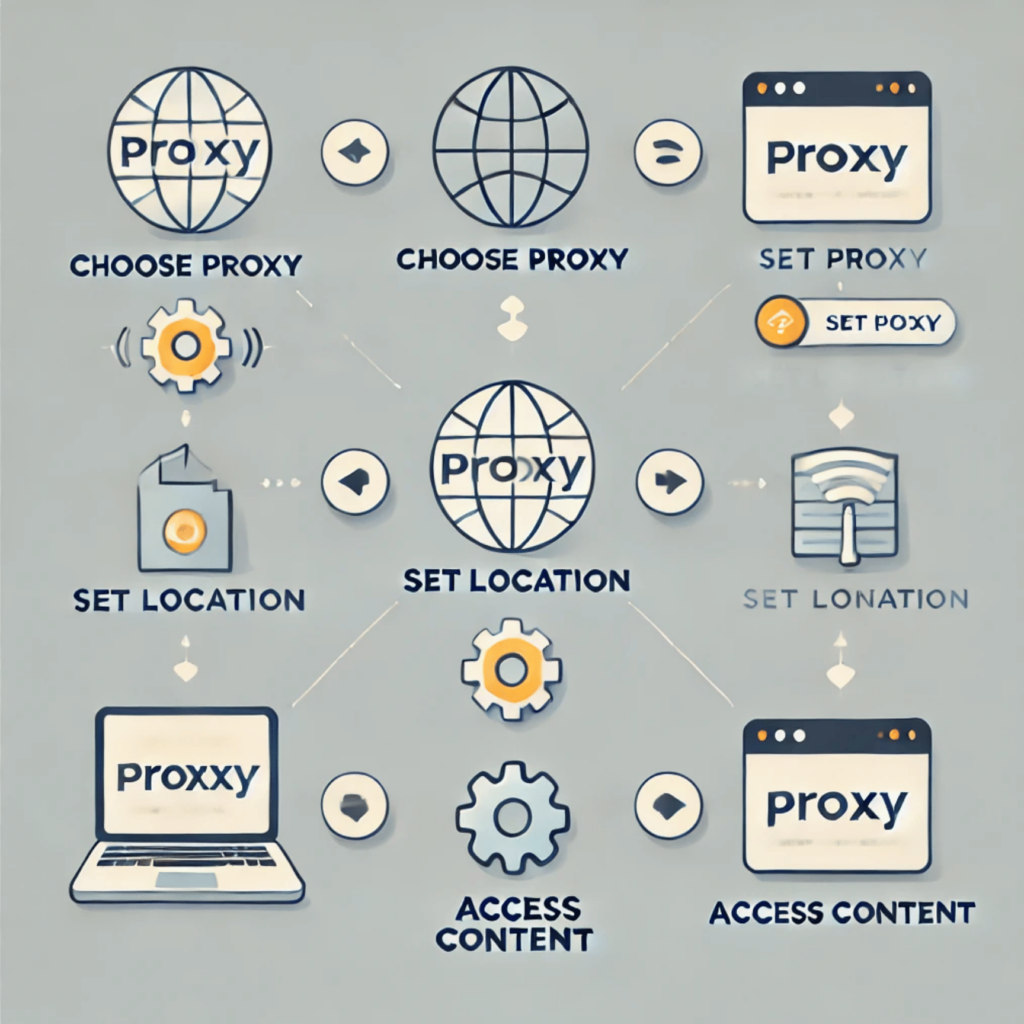Research is about discovery.
But gaining access to quality academic sources? It’s more like running a maze of paywalls, regional restrictions, and subscription fees. For students, independent researchers—really anyone without an institution’s access—it’s tough. The material’s there, but roadblocks keep them out.
Frustrating.
Enter proxies.
Proxies for academic research are the game-changer. They give you backdoor access, bypassing paywalls and IP blocks. Need unrestricted access to journals? Proxies let you go international. Blocked abroad? Proxies disguise your IP address, helping you explore journals worldwide.
Here’s how using proxies for academic research can unlock that access. Say goodbye to limits. With proxies, you’re free to study wherever you are.

How Academic Research Gets Blocked Online
Ever run into a paywall when you’re deep in research mode? Frustrating, right? Whether you’re a student, an independent researcher, or part of a smaller institution, those subscription blocks on academic journals can feel like hitting a brick wall.
But why do these barriers exist in the first place?
It’s often due to licensing agreements. Publishers create geo-blocks to restrict access to particular regions or sell access rights to specific institutions. So, if you’re in a country without many academic resources—or simply not enrolled at a major university—accessing essential research can feel impossible.
And then, there’s IP tracking.
Databases and journals track IP addresses to enforce these restrictions. Your IP address? It’s like your location’s digital fingerprint. By identifying it, these sites can instantly tell if you’re allowed in or not. If your IP doesn’t fit their location or institution criteria, you’re simply locked out.
That’s where proxies come in—giving you an alternate, region-appropriate IP and letting you work around these blocks.

The Role of Proxies in Accessing Restricted Journals
When access is denied to crucial academic resources, proxies are often the key to getting around those restrictions.
Think of proxies as middlemen. They mask your IP address by routing your connection through another server, making it appear as though you’re accessing from a different location. So, instead of hitting that dreaded “Access Denied” page, you can view journals as if you’re located somewhere else—like a university’s local network, or a region with fewer restrictions.
Now, for academic research, the type of proxy you choose can make all the difference. Residential proxies look like ordinary user IPs, which are harder for sites to block. When sites see an IP linked to a residential address, they’re far less likely to flag it as “suspicious,” making residential proxies ideal for accessing research databases.
But for researchers who need continuous, unrestricted access, rotating proxies are a lifesaver. They automatically switch IP addresses, giving you a different one for each connection. This means you can search and access multiple sources without triggering any site alarms—perfect for long study sessions.
With proxies, access to restricted journals can become routine, not a struggle. They let researchers study globally without leaving home, as if they’re stepping into that library across the ocean or down the road.

Steps to Set Up a Proxy for Academic Research (Simple Guide)
Setting up a proxy might sound technical, but with a few straightforward steps, you’ll be browsing with unrestricted access to all those vital research resources.
Step 1: Choose a Reliable Proxy Provider
A solid provider is key, and for researchers, reliability means consistent access without security risks. IPBurger, for instance, offers proxies specifically designed for secure, uninterrupted browsing, letting you focus on research rather than connection issues.
Step 2: Select the Right Proxy Type
Consider your research needs here. Residential proxies are ideal if you’re mainly accessing academic journals since they mimic typical residential IPs, bypassing most restrictions with ease. On the other hand, if you’re diving deep and need prolonged sessions, rotating proxies will keep you undetected by refreshing your IP periodically.
Step 3: Configure Proxy Settings
This setup varies based on the device and browser you’re using. Many proxy providers offer browser extensions that make this step seamless—just install the extension, and you’re set. Alternatively, configure proxies directly within your browser or research applications to ensure all browsing is covered.
Step 4: Test Access
Finally, give it a try. Head over to a restricted database and test your access. If anything goes wrong, IPBurger’s support is on standby to walk you through adjustments. With the right setup, your research flow should be smooth and uninterrupted.

Ethical Considerations in Using Proxies for Research
Using proxies for academic research opens up access, sure. But with that access comes a responsibility.
First off, there’s privacy. When you’re accessing restricted content, you want to make sure your data is secure. IPBurger, for instance, prioritizes this with encrypted connections and a strict no-logs policy. This means your browsing history, research activity, and personal data aren’t stored or monitored, letting you focus on research with peace of mind.
But privacy is just one piece of the puzzle. There’s also the ethical side of things. Just because proxies can bypass access restrictions doesn’t mean they should be used carelessly. Researchers need to respect fair usage policies, staying within the boundaries of academic integrity. Proxies are a tool, not a free pass to misuse data or violate copyright protections.
So, while proxies offer a powerful solution, they’re best used with a respect for data privacy and responsible access. Ethical research remains the goal. Proxies simply make it easier to reach.
Why IPBurger is Ideal for Academic Research Proxies
When it comes to academic research, having the right tools can make or break your access to information. IPBurger brings that access without the typical headaches, offering proxies specifically suited for researchers.
First, high-quality proxies. IPBurger’s residential proxies make it look like you’re browsing from a typical residential IP, reducing the chance of being flagged. They also offer rotating proxies, giving you a fresh IP each time you connect, which is a lifesaver for continuous research sessions.
Then there’s speed and reliability. Nothing’s worse than a sluggish connection when you’re on a roll with your research. IPBurger’s proxies are built to keep your connection fast and stable, meaning you don’t have to worry about drop-offs or lags interrupting your work.
And finally, dedicated support. Research can happen at any hour, and if you hit a snag, IPBurger’s 24/7 support team is ready to help. Whether it’s configuring your proxy settings or troubleshooting access issues, they’ve got you covered so you can focus on the research itself.
With IPBurger, proxies become an academic tool, not a technical challenge.
Simplify Your Research with Proxies
Academic research shouldn’t be about hitting walls. It should be about exploring, discovering, and understanding. Proxies make this possible by bypassing paywalls, navigating geo-restrictions, and granting access to the resources you need—no matter where you are.
With IPBurger’s high-quality proxies, you gain reliable, unrestricted access without sacrificing speed or privacy. Whether it’s a residential proxy for secure browsing or a rotating proxy to stay undetected, IPBurger has options tailored to research needs.
Ready to unlock a world of information? Start a trial with IPBurger and make restricted access a thing of the past. Because when research flows smoothly, discovery follows.
FAQs
Can proxies really help me access restricted academic journals?
Yes, proxies allow you to mask your IP address, making it appear as though you’re accessing the internet from a different location—one where the academic content is available. This way, you can bypass geo-restrictions and access paywalled journals securely and privately.
Are proxies safe for academic research?
Absolutely, as long as you use a reputable provider like IPBurger. IPBurger’s proxies come with encryption and a no-logs policy, which means your browsing data and research activity are kept private, giving you secure access to the content you need.
What type of proxy is best for accessing academic journals?
Residential proxies are often the best for academic research since they mimic typical user IPs and are less likely to be blocked. Rotating proxies are also great for continuous research sessions, as they change IP addresses frequently, reducing the risk of detection.



